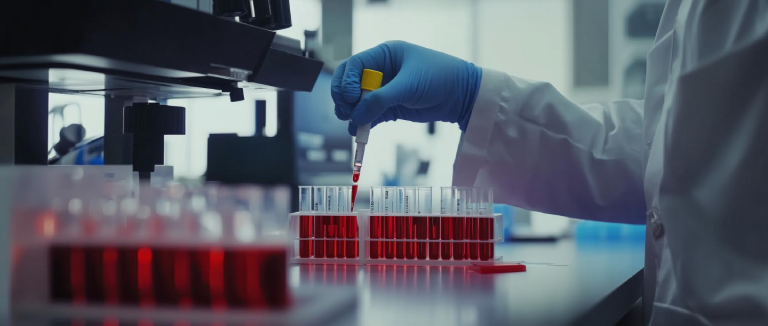Hematologic Conditions: Early Diagnosis and Advanced Treatment
Today, hematologic conditions can be managed far more effectively thanks to early diagnosis and advanced treatment methods. Liv Hospital Hematology Clinic provides personalized care through state-of-the-art facilities and a multidisciplinary team of specialists. In this article, we will discuss the vital role of early diagnosis in hematologic disorders, outline the key diagnostic methods, and review the leading treatment options available.

The Importance of Hematology
Hematology is the medical specialty focused on diseases of the blood, bone marrow, and lymphatic system. Conditions such as anemia, leukemia, lymphoma, clotting disorders, and bone marrow disorders are managed within this field. Notably, hematologic cancers like leukemia and lymphoma can often be treated successfully when detected early.
Diagnostic Methods in Hematology
Modern hematology relies on a layered diagnostic strategy starting with basic screening and moving toward advanced molecular and imaging techniques as needed. At Liv Hospital Hematology Clinic, high-quality diagnostics ensure patients receive timely, accurate diagnoses a prerequisite for effective, personalized care.
Core Tests and Their Roles
- Complete Blood Count (CBC)
- What it measures: Red blood cells, white blood cells, platelets, hemoglobin, hematocrit, and red cell indices.
- What it reveals: Key abnormalities such as anemia, leukocytosis or leukopenia, and thrombocytopenia or thrombocytosis.
- Why it matters: The CBC is often the first clue pointing toward iron deficiency, infections, bone marrow disorders, or hematologic malignancy.
- Peripheral Blood Smear
- What it shows: Morphology (shape and size) of blood cells, presence of immature or abnormal cells, and patterns indicative of hemolysis or dysplasia.
- Value: Microscopic review often clarifies CBC findings and can suggest specific diagnoses, such as leukemia, hemolytic anemia, or megaloblastic anemia.
- Coagulation Tests
- Includes: PT/INR, aPTT, fibrinogen, D-dimer, and specialized assays for factors and inhibitors.
- Conditions assessed: Bleeding disorders (e.g., hemophilia, von Willebrand disease), disseminated intravascular coagulation, liver disease-related coagulopathy, and thrombotic conditions.
- Bone Marrow Aspiration and Biopsy
- Purpose: Direct evaluation of bone marrow architecture and cellularity to diagnose conditions such as leukemia, lymphoma infiltration, myelodysplastic syndromes, aplastic anemia, and myelofibrosis.
- Added value: Enables cytogenetic and molecular studies, which are essential for precise classification and risk stratification.
- Genetic and Molecular Testing
- Techniques: Cytogenetics, FISH, next-generation sequencing (NGS), PCR-based mutation analysis.
- Application: Identification of chromosomal abnormalities and driver mutations (e.g., BCR‑ABL, JAK2, FLT3, NPM1) that guide targeted therapy and prognosis.
- Personalization: Genetic insights allow clinicians to tailor therapies to the tumor’s molecular profile, improving efficacy while limiting unnecessary toxicity.
- Advanced Imaging
- Modalities: PET-CT, CT, MRI, and ultrasound as indicated.
- Uses: Staging and response assessment in lymphoma and myeloma, evaluation of organ involvement, and detection of complications (e.g., thrombosis, organ enlargement).
Collectively, these diagnostic tools support a precise understanding of disease biology and stage, enabling the clinical team to design individualized treatment plans that align with each patient’s health status and goals.
Personalized Treatment Approach
At Liv Hospital Hematology Clinic, every patient is provided with an individualized treatment plan tailored to their specific disease type, stage, age, and overall health. The primary treatment methods include:
- Chemotherapy: Drugs that eliminate or slow the growth of malignant cells.
- Targeted Therapies: Precision treatments that attack cancer cells based on their genetic or molecular profile.
- Immunotherapy: Boosts the immune system’s ability to identify and destroy cancer cells.
- Bone Marrow and Stem Cell Transplantation: Essential for treating leukemia, lymphoma, and bone marrow disorders. This can involve autologous (self) or allogeneic (donor) stem cell transplantation.
- Supportive Treatments: Includes blood transfusions, infection control, and nutritional support to improve overall patient well-being.

Why Choose Liv Hospital Hematology Clinic?
Liv Hospital delivers world-class healthcare, combining advanced technology with a patient-centered philosophy. The Hematology Clinic distinguishes itself with the following features:
- Expert Medical Team: Skilled hematology specialists and an academic faculty utilizing the latest advancements in the field. Each physician is dedicated to continuous education and international collaboration to ensure the highest standards of care.
- Advanced Diagnostic & Treatment Facilities: PET-CT, MRI, genetic labs, and other state-of-the-art technologies are available, enabling accurate diagnosis and precision therapy.
- Personalized Treatment Plans: Every patient receives care tailored to their unique needs and condition, ensuring the most effective results and better quality of life during and after treatment.
- Patient-Centered Care: Enjoy private rooms, 24/7 physician support, and dietary programs designed for individual needs. The hospital environment promotes comfort, safety, and emotional well-being.
- Multidisciplinary Coordination: Integrated care across hematology, oncology, radiology, genetics, and more for comprehensive, seamless treatment that prioritizes communication, trust, and patient satisfaction.
Early Diagnosis Saves Lives
Hematologic conditions require immediate medical attention when symptoms arise. Fatigue, pallor, unexplained bruising, frequent infections, or unusual bleeding tendencies could indicate an underlying disorder. Regular health check-ups and early detection significantly improve treatment outcomes.
Conclusion
In conclusion, individualized treatment approaches play a crucial role in the diagnosis and management of hematologic disorders. Liv Hospital Hematology Clinic continues to provide top-tier medical care with its expert team and advanced technology, ensuring the best possible outcomes for its patients.
* Liv Hospital Editorial Board has contributed to the publication of this content .
* Contents of this page is for informational purposes only. Please consult your doctor for diagnosis and treatment. The content of this page does not include information on medicinal health care at Liv Hospital .
For more information about our academic and training initiatives, visit Liv Hospital Academy
Frequently Asked Questions
What are hematologic conditions?
Hematologic conditions are disorders affecting the blood, bone marrow, or lymphatic system, such as anemia, leukemia, lymphoma, and clotting disorders.
What symptoms may indicate a blood disorder?
Fatigue, frequent infections, easy bruising, persistent bleeding, or unexplained weakness may signal an underlying hematologic issue.
How are blood diseases diagnosed?
Diagnosis involves tests like CBC, peripheral smear, coagulation tests, bone marrow biopsy, genetic analysis, and advanced imaging.
Why is a CBC important in detecting blood disorders?
A CBC reveals abnormalities in red cells, white cells, and platelets, helping detect anemia, infections, or potential malignancies.
What is the role of a bone marrow biopsy?
It evaluates bone marrow structure and cell production, helping diagnose leukemia, lymphoma, myelodysplastic syndromes, and other marrow diseases.
How does genetic testing help in hematology?
Genetic and molecular tests identify mutations that guide targeted therapy and help determine prognosis.
What treatments are used for hematologic diseases?
Treatment may include chemotherapy, targeted therapy, immunotherapy, stem cell transplantation, and supportive care.
Who might need a stem cell transplant?
Patients with leukemia, lymphoma, myeloma, or severe bone marrow disorders may benefit from autologous or allogeneic transplantation.
Why choose Liv Hospital for hematology care?
Liv Hospital offers advanced diagnostics, expert specialists, modern facilities, and personalized treatment plans.
How important is early diagnosis in blood diseases?
Early detection leads to more effective treatment, better outcomes, and improved survival in many hematologic conditions.










